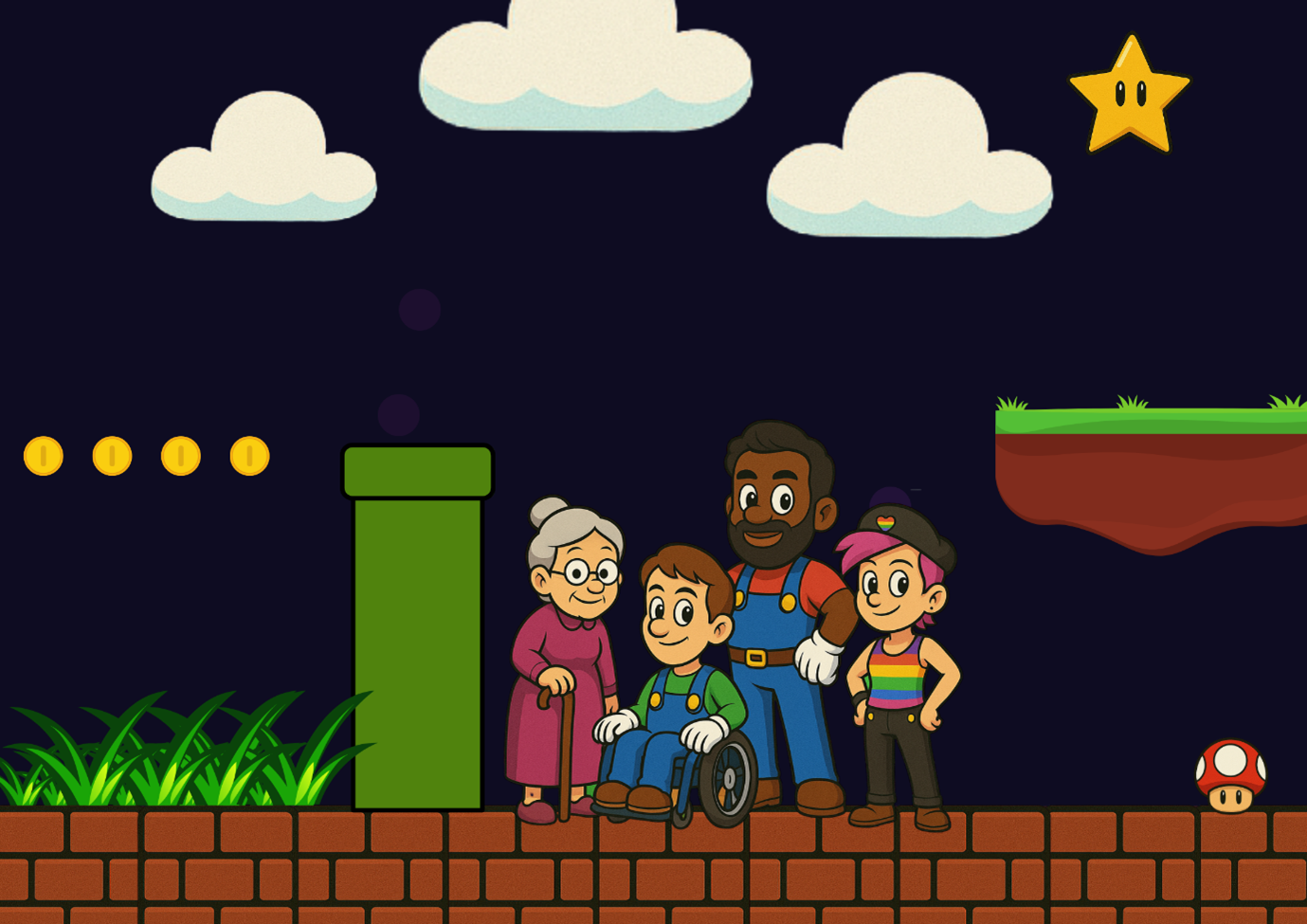
Nākamā līmeņa sasniegšana: Kāpēc dažādībai, vienlīdzībai un iekļaušanai (DEI) ir nozīme spēļu izstrādē?
Kas notiktu, ja nākamā spēle, kuru tu spēlētu, ne tikai izklaidētu tevi, bet arī liktu tev justies pamanītam, sadzirdētam un daļai no kaut kā lielāka? Tā ir viena no galvenajām idejām, kas stāv aiz mūsu projekta „Video Games For Good”. Tas ir ne tikai pievilcīgs nosaukums, bet arī aicinājums spēļu izstrādātājiem radīt iekļaujošas, uz kopienu orientētas spēles.
Spēļu nozare ir mainījusies, tāpēc jāmainās arī stāstiem, ko mēs stāstām.
Laiki, kad videospēles bija tikai jauno, heteroseksuālo balto vīriešu nodarbe, ir sen pagājuši. Šodien spēlētāji nāk no visdažādākajām demogrāfiskajām grupām. Viņi ir visdažādākā vecuma, dzimuma, spējām, izcelsmes un identitātes. Daudzos aspektos spēļu kopiena atspoguļo pašu sabiedrību (forši, vai ne?). Tomēr pārāk daudzas spēles joprojām attēlo tikai vienu šauru cilvēces daļu.
Ir skaidrs, ka tādas spēles kā Pac-Man, Super Mario Bros, Tetris un Minecraft ir ietekmējušas kultūru. „Ar [šo] spēku nāk liels atbildības slogs”. Iekļaušana nav tikai „patīkama”, tā ir būtiska. Kad spēles atspoguļo pasauli visās tās izpausmēs, tās var mainīt domāšanas veidu, veicināt empātiju un savienot cilvēkus, kuri reālajā dzīvē nekad nebūtu satikušies.
Reprezentācija nav tikai par redzamību. Tā ir par pārmaiņām.
Atceries pirmo reizi, kad tu patiesi identificējies ar spēles varoni (tā bija absolūti fantastiska sajūta, vai ne?). Varbūt tas bija varonis, kurš izskatījās kā tu, runāja kā tu vai bija piedzīvojis līdzīgas pieredzes. Šī sajūta, ka tevi pamana, var būt ļoti spēcīga. Spēlēs, kurās tu bieži kontrolē stāstu, tā var mainīt dzīvi. Kontrolēt sev līdzīgu varoni, kurš atspoguļo tavas domas, cīņas vai identitāti, rada dziļu personisku iespaidu. Tas noteikti nav tas pats, kas vadīt vispārēju varoni. Tā ir atšķirība starp „spēlēt spēli” un „dzīvot to”.
Kad spēļu izstrādātāji apzināti iekļauj tēlus no dažādām rasēm, dzimumiem, spējām un identitātēm, viņi nedara tikai to, ka atzīmē atbilstošo lodziņu. Viņi sūta spēcīgu vēstījumu miljoniem (ja ne miljardiem) spēlētāju: „Tu piederies šeit”.
Dažādība veicina radošumu un inovācijas.
Kad līdzīgi cilvēki veido līdzīgas spēles, mums kļūst… garlaicīgi. Monokultūra ierobežo inovācijas un tādējādi arī iztēli. Iekļaujoši tēli un stāsti ir labi ne tikai marginalizētajām grupām, bet visiem (ieskaitot heteroseksuālos vīriešus). Pat dominējošo grupu pārstāvji iegūst jaunas perspektīvas, apšauba pieņēmumus un pieredz pasauli tādu, kāda tā patiesībā ir. “Tas ne tikai dod labumu spēlētājiem, bet arī palielina nozares rentabilitāti un ilgtspēju” (Silicon Valley University, 2024. gada augusts).
Neatkarīgi no tā, vai sadarbojies ar svešiniekiem citās laika zonās vai čato Discord, savienojums neveidojas nejauši. Iekļaujošas spēles veicina kopienas, kas prioritizē empātiju un cieņu (jautā jebkuram spēļu dizaineram, vai viņš vēlas, lai viņa spēle būtu pazīstama ar pozitīvu vai toksisku kopienu). Spēles, kas atbalsta iekļaušanu, var apstrīdēt stereotipus un burtiski aicināt spēlētājus iejusties cita cilvēka ādā (un tas ir spēles patiesais spēks).
Spēļu nākotnei ir neierobežots potenciāls. Tomēr, lai to atraisītu, nozarei ir jāapņemas stāstīt stāstus, kas atspoguļo ikvienu. Video Games For Good nav vienkārši vēl viens Eiropas projekts, tas ir pārliecība. Pārliecība, ka spēles var darīt vairāk nekā tikai izklaidēt. Tās var veidot empātiju, veicināt sapratni un sekmēt taisnīgumu.
Tāpēc nākamreiz, kad ieiesiet virtuālajā pasaulē, pajautājiet sev: kāds stāsts tiek stāstīts? Un kāds stāsts trūkst? Tāpēc atcerieties, jo iekļaujošākas ir mūsu spēles, jo spēcīgāka kļūst mūsu kopiena un jo labāka var būt mūsu pasaule!
Ja tu vēlies uzzināt vairāk par iekļaušanu spēlēs, apskati mūsu rīku kopumu un tiešsaistes kursus. Tu atradīsi daudz resursu, piemēram, GDI rokasgrāmatu un Think Thank for Inclusion & Equity faktu lapas, kas palīdzēs tev tavā iekļaušanas ceļojumā.
Resursi:
Game Developers for Inclusion. (n.d.). GDI playbook: Building equitable futures through play. https://www.gdiplaybook.org/gdi-playbook
Think Tank for Inclusion & Equity. (n.d.). Factsheets. Write Inclusion. https://www.writeinclusion.org/factsheets
University of Silicon Valley. (2024, August 20). The importance of diversity and inclusion in gaming. https://usv.edu/blog/the-importance-of-diversity-and-inclusion-in-gaming/
Moldstud. (2024, February 13). Pgame developers and the importance of diversity. Moldstud. https://moldstud.com/articles/p-game-developers-and-the-importance-of-diversity
